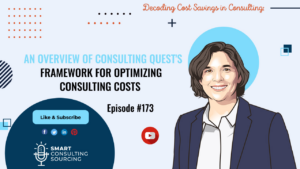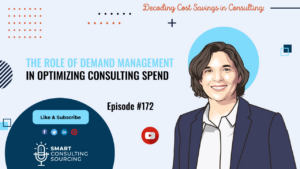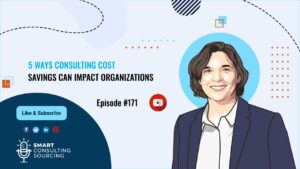Welcome back to Smart Consulting Sourcing, the only podcast about consulting procurement. If you are looking to mastering the art of sourcing consulting services, you’ve come to the right place.
In this episode of our series “How to buy consulting services like a pro,” we’re going to tackle the next crucial steps in the process: briefing your candidates and handling the Q&A sessions.
Let’s kick things off by revisiting last week’s episode and recapping the key takeaways on how to refine your list of candidates for your project and check references.
Yes, we know it’s not the most exciting topic, but trust us, it’s essential to make the right choice.
First things first, don’t skip checking references! Don’t be fooled by flashy websites or smooth-talking consultants. You want to make sure the consulting firm you’re considering has the skills and experience they claim to have.
When checking references, make sure you ask the right questions. Focus on the consultant’s understanding of your situation, their knowledge and experience, and their fit with your team and culture. Or whatever is relevant to your project, of course.
And to make sure you’re getting genuine feedback, we use the 4R approach: real, relevant, recent, and related. So, you don’t waste time talking to fake references or hearing about outdated projects.
Last but not least, don’t compromise on the references. If a consulting firm refuses to provide references or uses confidentiality as an excuse, don’t hesitate to call in a third-party player like Consulting Quest to help you check the references and make the right choice for your project.
Remember, checking references is not only about ensuring that the consulting firm has the necessary skills and experience but also about ensuring that you have a good fit and working relationship with the consultant team. So, take the time to do it right!
In case you missed our previous episode, you can listen to all our episodes on Spotify, iTunes, or YouTube. And if you prefer reading, you can find the full transcripts in the Thought Leadership section of consultingquest.com.
Briefing and Q/A Session – How to Go About It for Effective Buying Consulting?
In this episode, we’ll cover everything you need to know about preparing and delivering a comprehensive briefing to your consulting candidates and how to handle the Q&A sessions. So, get ready to take some notes and let’s dive in!
Stat By Signing an NDA
You’ve selected the best consulting firms to send your RFP to, but before you start sharing your company’s secret sauce, take a step back and ask yourself, “Did we sign an NDA with them?”
Why is it so important, you ask? Well, you could be sharing confidential information about your strategy, your product line, your innovations, or any other trade secret that gives your company a competitive advantage. And let’s face it, consultants make a business of selling their expertise and knowledge.
If you’ve worked with the firm before, it’s worth checking if they have an MSA (which often includes a confidentiality clause) or an active NDA. But even if they have signed something already, it might be worth considering signing a specific NDA for this project, especially if the information is particularly sensitive. That way, you can show the consultant that confidentiality is a top priority for you.
Remember, don’t overlook the NDA. It’s an essential step in the process that can save you from potential headaches down the road.
It is time to send your RFPs to your consulting candidates. But what if you’re on a tight schedule and need to speed things up? Well, fear not! I’ve got a couple of tricks up my sleeve to help you accelerate the process.
First, consider sending along the terms and conditions with the RFP. This way, contract negotiations can be done in parallel. Believe me, I’ve been there before. Contract negotiations can sometimes take longer than the selection process itself. I once spent nearly three weeks ironing out the liability, warranty, and IP clauses, causing my client to postpone their project multiple times. It was a real shame.
Secondly, schedule your briefings with the consultants before you even receive the proposals. By doing this, you won’t waste precious time trying to find a suitable time slot that works for everyone. Trust me, those couple of days can make a big difference.
Why Schedule Briefing Sessions Before You Receive Proposals From Potential Partners?
Let’s make a case for the power of briefings. I know some executives and procurement leaders out there prefer to have a first round of proposals on paper. But trust me, when it comes to consulting, that’s a recipe for disaster—unless you enjoy drowning in a sea of 15 suppliers’ proposals or you have a project so straightforward that it practically sings “Twinkle, Twinkle Little Star.”
But let’s be real here. Having a lineup of 15 suppliers in the first round? That’s just plain bonkers. It’s like playing a game of chance where your odds of success are a measly 1 out of 15 (that’s a whopping 6%, by the way). Now, we don’t know about you, but we wouldn’t bet our project’s future on those slim chances.
Let’s think about it logically. Proposals, as impressive as they may be, are just fancy pieces of paper. They don’t tell you the whole story. You can’t assess the chemistry or the fit between your team and the consultants from a proposal alone. It’s like judging a book by its cover without even peeking inside.
Here’s a smarter approach: let’s show some respect for the consultants’ time and energy. Preparing a proposal takes a whole lot of effort. And in the world of consulting, time is money. Instead of bombarding them with requests for proposals right off the bat, let’s be more considerate.
That’s where the beauty of the briefing session comes in. Schedule it before receiving those proposals. It’s your chance to dive deeper, ask questions, and really get to know the consultants. You can clarify your needs, understand their expertise and approach, and establish that all-important personal connection.
Remember, a successful project isn’t just about numbers on paper or a fancy presentation. It’s about people working together, synergizing their skills, and creating something amazing. So let’s put in that extra effort and give ourselves a fighting chance to find the perfect consultant match. Trust us, the payoff will be well worth it in the end.
Key Points to Cover During the Briefing Session
First things first, you want to make sure those consultants have done their homework. They should have read your RFP (Request for Proposal), so it’s the perfect opportunity to check their understanding of the problem at hand. This step serves two purposes. Not only can you assess whether they’ve truly grasped the essence of your project, but it also allows you to gauge the clarity and effectiveness of your RFP. Trust us, feedback on your RFP writing skills is a rare gem in the consulting world, and it can help you fine-tune your future RFPs.
Moving on, it’s time to give the consultants the floor. Encourage them to ask questions about the background and context of your project. This is their chance to dive deeper and gain a comprehensive understanding of your unique situation. The more information they have, the better equipped they’ll be to tailor their approach and provide valuable insights.
Now, here’s where precision becomes your best friend. Be crystal clear about the exact scope of the project. Specify which parts of the company will be involved, which functions will be impacted, and the number of people who will be affected. This level of detail is crucial for the consultants to accurately size their team and determine the workload required. The more precise you are, the more accurate their proposals will be, and the better the price. Let’s share a little insider tip with you. When consultants aren’t completely certain about the scope of a project, they tend to err on the side of caution. They’ll take a safety net approach and slightly overestimate the workload to mitigate any uncertainties. It’s their way of covering all the bases and ensuring they’re prepared for any unexpected twists and turns. But here’s the secret sauce: when you provide clear and precise details during the briefing session, you remove that safety net. Consultants can confidently assess the actual workload and deliver a more competitive price.
A well-crafted question can go a long way. Let us share with you two power-packed questions that are sure to make an impact during your briefing session. Here they are:
First up, we have the question that sets the stage for success: “What does success look like?”
Even if the consultants don’t ask it, put it on the table. This question gives them a crystal-clear picture of the endgame—the ultimate goal you’re aiming for. Why is it so important? Well, let me tell you a little secret. There are a hundred different ways to answer the same RFP, and each consultant might have a unique approach. By sharing your vision of success, you provide them with a clear direction, ensuring that everyone is on the same page.
Now, let’s move on to our second question, and this one’s a gem: “What would make you choose us?” Ideally, this question should come from the consultants themselves, but here’s the genius part—you can initiate it. Why? Because it’s a smart way to know exactly what you’re looking for in a consulting firm. It forces you to articulate the criteria for selection and prioritize them. Think of it as a mini-reflection exercise that helps you align your needs and expectations. And hey, even if those criteria are already mentioned in the RFP, this question gives them an extra spotlight.
Prepare For an Effective Q&A Session
Alright, folks, let’s dive now into the exhilarating world of Q&A sessions because guess what? They actually start right from the briefing itself! But before we jump into the nitty-gritty, let’s take a moment to understand the true purpose of this process.
Picture this: the goal of the briefing and the subsequent Q&A session is to arm all the consultants with the essential information they need to craft a masterpiece of a proposal. We want them to bring their A-game, right? But here’s the catch – every consultant should have access to the same information. Yes, it’s all about a level playing field.
Now, here’s a fascinating observation I’ve made over the years. Executives tend to become more direct and comfortable with the briefing process. Their answers become sharper, more precise, and loaded with valuable insights. And that gives a clear advantage to the last consultant who receives the briefing. But hey, that’s not fair play!
To ensure fairness and maintain healthy competition, it’s crucial to share the same information with every consultant. This levels the playing field and allows all the consultants to put their best foot forward. It’s like giving everyone the same set of tools, so they can unleash their creativity and dazzle you with their proposals.
During the briefing and subsequent Q&A, consultants may come up with their own unique set of questions. They’re like little puzzle pieces scattered around, waiting to be assembled into a complete picture. Now, your mission, should you choose to accept it, is to gather all those questions and create a comprehensive FAQ document.
By consolidating the questions asked during the session, you’re ensuring that all the consultants receive the same information. It’s like giving them a treasure trove of answers, neatly packaged and ready to be unleashed upon the world. Plus, it saves you from the hassle of repeating yourself multiple times. This ensures maximum efficiency of the process!
Picture this: you’re in the midst of a Q&A session, and a consultant throws a question your way that seems oh-so-crafty. They’re trying to unlock the secrets of the universe, or in this case, gain an advantage in the proposal game. Seems sneaky, doesn’t it?
But fear not. Remember that you hold the power in this cosmic consulting journey. You have the ability to decide what information should remain private.
So, my advice to you is this: embrace the spirit of fairness but don’t be afraid to set boundaries. Share the information that will enable consultants to craft exceptional proposals, but keep certain details private when necessary. It’s a delicate balance, like walking a tightrope in the consulting circus.
And we reach the end of this episode, it’s time to gather our thoughts and uncover the golden nuggets of wisdom from today’s episode. So, dear listeners, here are the key takeaways to remember:
Sign that NDA! When sharing confidential information with consulting firms, ensure that you have a non-disclosure agreement in place. Protect your secret sauce and maintain trust.
Embrace the power of briefings. Don’t jump straight to reviewing proposals on paper. Schedule a briefing session with the consultants to clarify your needs, ask questions, and establish a personal connection. It’s like a prelude to the consulting symphony.
Precision is the name of the game. Be crystal clear about the scope of your project, the specific areas it will impact, and the number of people involved. The more precise you are, the more accurate the proposals will be. And hey, it might even help you get a better price!
Two powerful questions to ask during briefings. First, explain what success looks like to align expectations and give a clear direction to consultants. Second, tell them what would make you choose them. It helps you articulate your selection criteria and prioritize them.
Keep it fair and share the same information. In the spirit of fairness, consolidate the questions asked during the Q&A session and ensure that all consultants have access to the same information. It’s the golden rule of equality in the consulting universe.
Well, that’s a wrap for today’s episode! But don’t you worry, the adventure doesn’t stop here. In fact, we’re just getting warmed up! So, what’s in store for our next rendezvous? Brace yourselves because we’ll be diving headfirst into the thrilling world of comparing and grading proposals. So, mark your calendars, set those reminders, and join Helene next time on Smart Consulting Sourcing for another electrifying episode.
Till then, stay safe and happy sourcing and if you have any questions regarding today’s topic or any consulting procurement-related topic actually, remember you can always contact us directly on LinkedIn or by email because we’re always game for a chat.
Bye and see you next week, au revoir.







